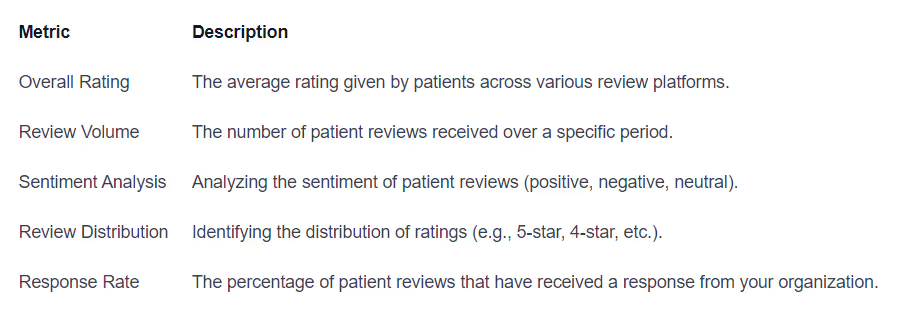Healthcare Reputation Management: Tips & Best Practices
In the healthcare industry, reputation management plays a crucial role in establishing trust, attracting patients, and maintaining a positive image.


Healthcare Reputation Management: Tips & Best Practices
The Importance of Healthcare Reputation Management
In the healthcare industry, reputation management plays a crucial role in establishing trust, attracting patients, and maintaining a positive image. A healthcare organization's reputation is built upon the perceptions, experiences, and opinions of patients, staff, and the community. Effectively managing this reputation is essential for long-term success and growth.
Understanding Healthcare Reputation Management
Healthcare reputation management involves actively monitoring and influencing the way a healthcare organization is perceived by its stakeholders. It entails strategies and practices aimed at shaping public opinion, improving patient experiences, and addressing feedback, both positive and negative. By managing their reputation, healthcare organizations can cultivate trust, credibility, and patient loyalty.

Why Reputation Management Matters in Healthcare
Reputation management holds significant importance in the healthcare industry due to several reasons:
- Trust and Credibility: Patients place a high value on the reputation of healthcare providers when making decisions about their care. A positive reputation instills trust and confidence in potential patients, leading to increased patient volume and market share.
- Patient Acquisition and Retention: A strong reputation attracts new patients and helps retain existing ones. Positive word-of-mouth referrals and online reviews can have a significant impact on a healthcare organization's ability to attract and retain patients.
- Competitive Advantage: In today's highly competitive healthcare landscape, a positive reputation can set a healthcare organization apart from its competitors. It can serve as a differentiator and influence patients' decisions when choosing a provider.
- Brand Image and Perception: Reputation management helps shape the brand image and perception of a healthcare organization. A positive reputation can position the organization as a trusted and reliable healthcare provider, leading to increased brand loyalty.
- Risk Mitigation: By actively monitoring and managing their reputation, healthcare organizations can identify and address potential issues before they escalate. This proactive approach helps mitigate risks, protect against negative publicity, and maintain a positive image.
To effectively manage their reputation, healthcare organizations must implement best practices, employ strategies to handle negative feedback, and continuously measure and improve their reputation metrics. By doing so, they can establish themselves as reputable and trusted providers in the eyes of patients, staff, and the community.

Best Practices for Healthcare Reputation Management
To effectively manage the reputation of a healthcare organization, it is essential to implement best practices that help maintain a positive image and build trust with patients. Here are some key strategies to consider:
Monitor Your Online Presence
Monitoring your online presence is crucial in today's digital age. Regularly monitoring online platforms, review sites, and social media channels allows you to stay informed about what patients are saying about your organization. Being aware of both positive and negative feedback enables you to address concerns promptly and take appropriate action.

Respond Promptly and Professionally to Feedback
When patients provide feedback, whether positive or negative, it is important to respond promptly and professionally. Acknowledge their feedback and address any concerns they may have. By demonstrating that you value patient opinions and are committed to resolving issues, you can enhance the reputation of your healthcare organization.
Foster Positive Patient Experiences
Providing exceptional patient experiences is a fundamental aspect of reputation management. Ensure that every interaction, from the moment a patient enters your facility to the completion of their treatment, is positive and patient-centered. Train your staff on effective communication, empathy, and customer service skills to create an environment that fosters patient satisfaction and loyalty.
Build Strong Relationships with Patients
Building strong relationships with patients is key to maintaining a positive reputation. Encourage open and transparent communication, actively listen to patient concerns, and strive to exceed their expectations. By establishing trust and cultivating long-term relationships, you can enhance patient satisfaction and generate positive word-of-mouth referrals.
By implementing these best practices, healthcare organizations can effectively manage their reputation, build patient trust, and establish a positive online presence. Regularly monitoring feedback, promptly responding to patient concerns, fostering positive experiences, and building strong patient relationships are integral to maintaining a stellar reputation in the healthcare industry.
Tips for Effective Reputation Management
Maintaining a strong and positive reputation in the healthcare industry is essential for building trust with patients and attracting new ones. Effective reputation management involves various strategies and techniques. Here are some tips to help you manage your healthcare reputation effectively:
Develop a Strong Online Presence
In today's digital age, having a strong online presence is crucial for reputation management. Create a professional website that showcases your healthcare services, expertise, and patient testimonials. Optimize your website for search engines to ensure it appears in relevant search results. Regularly update your website with informative and engaging content to establish yourself as a trusted source of healthcare information.
Additionally, consider creating profiles on relevant online directories and review platforms. This allows patients to find and review your practice, helping to build your online reputation. Ensure that all your online listings are accurate, consistent, and up-to-date.
Implement a Review Management Strategy
Online reviews have a significant impact on a healthcare provider's reputation. Implement a review management strategy to actively monitor and respond to patient reviews. Encourage satisfied patients to leave positive reviews and address any negative feedback promptly and professionally.
Maintain a proactive approach by setting up alerts for new reviews and responding in a timely manner. Acknowledge positive reviews with gratitude, address concerns raised in negative reviews, and offer solutions where appropriate. By actively engaging with patient feedback, you demonstrate your commitment to patient satisfaction and enhance your reputation.
Utilize Social Media for Engagement
Social media platforms provide an excellent opportunity to engage with patients and establish a positive online presence. Create social media accounts for your practice and regularly share informative and engaging content related to healthcare. Encourage patient interaction by responding to comments, messages, and inquiries promptly and professionally.
Utilize social media as a platform to educate patients, share healthcare tips, and promote community involvement. Engaging with patients on social media helps to build trust, foster relationships, and enhance your overall reputation.
Train Staff on Customer Service and Communication
The reputation of a healthcare provider is closely tied to the interactions patients have with staff members. Ensure that all staff members receive proper training on customer service and effective communication. Emphasize the importance of professionalism, empathy, and clear communication in all patient interactions.
Encourage staff members to actively listen to patient concerns, address questions promptly, and provide accurate information. By delivering exceptional customer service, you can create positive patient experiences and enhance your reputation.
By following these tips for effective reputation management, you can cultivate a positive image in the healthcare industry. Developing a strong online presence, implementing a review management strategy, utilizing social media for engagement, and training staff on customer service and communication are essential steps toward building and maintaining a strong healthcare reputation.
Handling Negative Reviews and Feedback
In the realm of healthcare reputation management, addressing negative reviews and feedback is a critical aspect. By handling negative feedback constructively, dealing with false or misleading reviews, and encouraging positive reviews and testimonials, healthcare organizations can effectively manage their online reputation.
Addressing Negative Feedback Constructively
Negative feedback can present an opportunity for healthcare organizations to demonstrate their commitment to patient satisfaction and continuous improvement. When responding to negative reviews, it is essential to do so in a constructive and professional manner. Here are some key steps to consider:
- Listen and empathize: Take the time to understand the patient's concerns and acknowledge their experience. Show empathy and let them know that their feedback is valuable.
- Respond promptly: Timely responses demonstrate your commitment to addressing patient concerns. Aim to respond within 24-48 hours to show that you take their feedback seriously.
- Apologize and take responsibility: If a mistake or misunderstanding has occurred, apologize sincerely and take responsibility for the issue. Assure the patient that steps will be taken to prevent similar situations in the future.
- Offer a solution or resolution: Provide a practical solution to address the patient's concerns, whether it involves scheduling a follow-up appointment, offering a refund, or taking corrective actions.
- Take the conversation offline: To maintain patient privacy and confidentiality, encourage the patient to reach out directly through phone or email to discuss the matter further.
Dealing with False or Misleading Reviews
While healthcare organizations strive for transparency and accountability, false or misleading reviews can occasionally appear. It is crucial to address these reviews professionally and take appropriate actions. Here are some strategies to consider:
- Investigate the review: Thoroughly examine the details of the review to determine its accuracy. Look for any inconsistencies or signs of fabricated information.
- Gather evidence: Collect any evidence or documentation that can refute the false or misleading claims made in the review. This may include appointment records, test results, or witness statements.
- Reach out to the review platform: If you believe a review violates the platform's guidelines or terms of service, you can report it and provide supporting evidence for their review process.
- Craft a professional response: Respond to the review in a calm and respectful manner, providing factual information to counter any false claims. Avoid engaging in arguments or disputes publicly.
- Encourage genuine reviews: Encourage satisfied patients to share their positive experiences through genuine reviews. This can help counterbalance any false or misleading reviews that may be present.
Encouraging Positive Reviews and Testimonials
Positive reviews and testimonials play a vital role in enhancing the reputation of healthcare organizations. Encouraging patients to share their positive experiences can contribute to a strong online presence and build trust with potential patients. Here are some effective strategies to encourage positive reviews and testimonials:
- Provide a seamless patient experience: Focus on providing exceptional care and service to patients. When patients have positive experiences, they are more likely to share their satisfaction with others.
- Offer multiple review platforms: Make it easy for patients to leave reviews by providing links or instructions for various review platforms, such as Google, Yelp, or specific healthcare review sites.
- Send follow-up emails or surveys: After a patient's visit, send a follow-up email or survey to gather feedback. Include links to review platforms for patients to share their positive experiences.
- Share patient testimonials on your website: With patient consent, feature positive testimonials on your website. Highlighting real patient experiences can inspire confidence in potential patients.
- Express gratitude: Show appreciation to patients who take the time to leave positive reviews. Respond to their reviews with a personalized message expressing gratitude for their support.
By effectively handling negative feedback, addressing false or misleading reviews, and encouraging positive reviews and testimonials, healthcare organizations can actively manage their online reputation and foster a positive perception among patients and the wider community.
Measuring and Improving Reputation
Managing and enhancing your healthcare reputation requires ongoing effort and a data-driven approach. By tracking and analyzing online reputation metrics, implementing continuous improvement strategies, and seeking professional assistance if needed, you can measure and improve your healthcare reputation effectively.
Tracking and Analyzing Online Reputation Metrics
To gauge the effectiveness of your reputation management efforts, it's essential to track and analyze various online reputation metrics. This allows you to understand how your healthcare organization is perceived by patients and identify areas for improvement. Some key metrics to consider are:

By regularly monitoring these metrics, you can gain valuable insights into patient satisfaction, identify trends, and address any recurring issues proactively.
Implementing Continuous Improvement Strategies
Once you have collected data on your healthcare reputation, it's crucial to implement continuous improvement strategies. This involves taking proactive steps to enhance patient experiences and address any concerns. Some strategies to consider include:
- Conducting regular patient satisfaction surveys to gather feedback and identify areas for improvement.
- Implementing quality improvement initiatives based on patient feedback and industry best practices.
- Investing in staff training programs that focus on customer service, effective communication, and empathy.
- Engaging in ongoing dialogue with patients to understand their needs and expectations.
By continuously striving to improve patient experiences, you can strengthen your healthcare reputation and build trust among your target audience.
Seeking Professional Assistance if Needed
Managing healthcare reputation can be a complex task, and sometimes it may be beneficial to seek professional assistance. Reputation management companies specializing in healthcare can provide valuable expertise and guidance. They can help you navigate challenges, implement effective strategies, and monitor your online reputation more efficiently.
When considering professional assistance, ensure that the company has experience in healthcare reputation management and a track record of success. Collaborating with professionals who understand the unique dynamics of the healthcare industry can significantly enhance your reputation management efforts.
Remember, reputation management is an ongoing process that requires dedication and continuous evaluation. By tracking and analyzing online reputation metrics, implementing improvement strategies, and seeking professional assistance if needed, you can effectively measure and enhance your healthcare reputation, ultimately strengthening patient trust and loyalty.
Reference:
Healthcare Reputation Management: Tips & Best Practices
A Guide To Healthcare Online Reputation Management







